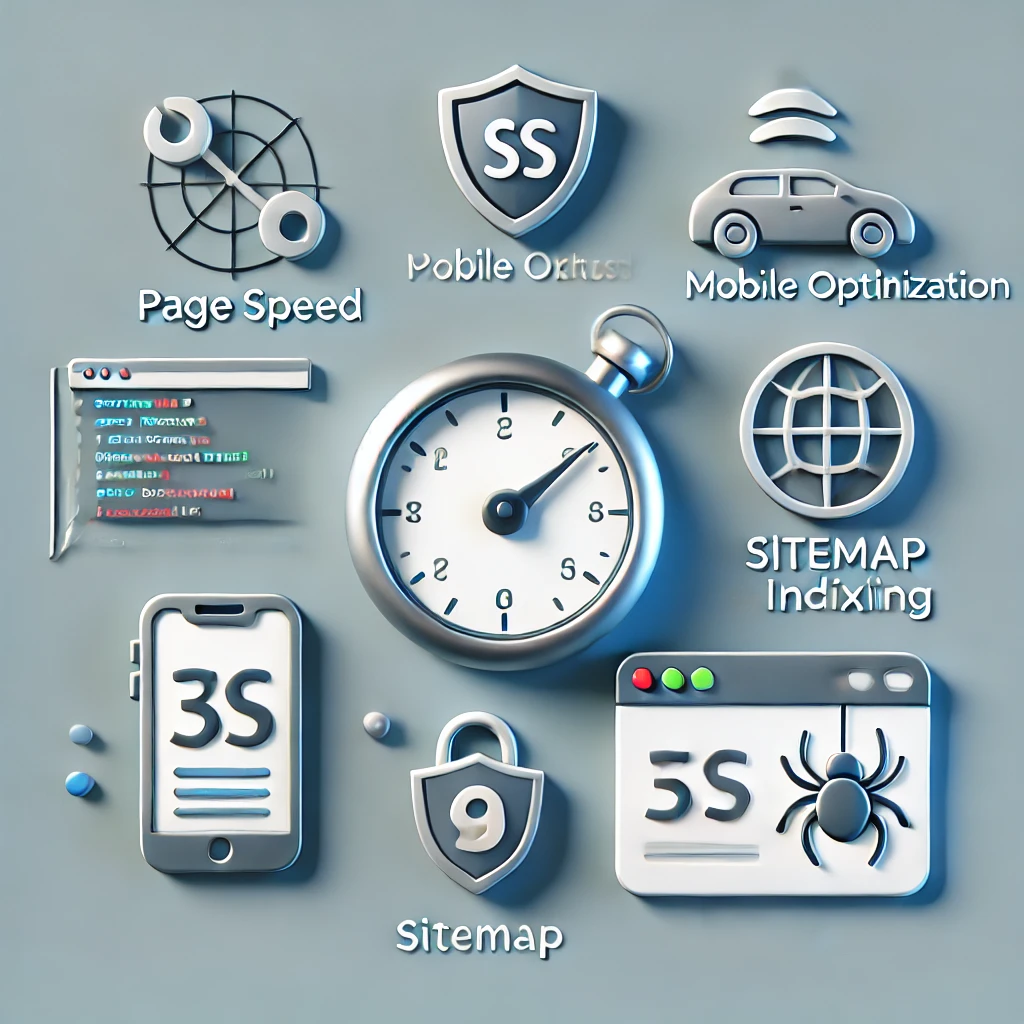Introduction
Technical SEO refers to the optimization of a website’s infrastructure to improve search engine crawling, indexing, and overall site performance. It plays a crucial role in ensuring that search engines can easily access, understand, and rank your content. This blog will explore the main areas of technical SEO, why they matter, and how they impact a website’s visibility in search results. Book a free consultation with Revenue Boomers to get expert advice on optimizing your website’s technical SEO.
Table Of Contents
- What Are The Main Areas Of Technical SEO
- Website Crawling And Indexing
- Site Speed Optimization
- Mobile-Friendliness
- Secure Sockets Layer (SSL) / HTTPS
- Structured Data And Schema Markup
- XML Sitemaps And Robots.txt
- URL Structure And Site Architecture
- Duplicate Content And Canonicalization
Website Crawling And Indexing
Search engines use bots (or crawlers) to discover web pages and index them. For technical SEO, it is crucial to ensure that these crawlers can efficiently access all the pages on a website. This involves:
- Ensuring All Important Pages Are Crawlable: Using tools like Google Search Console to check crawl status.
- Managing Crawl Budget: Optimizing how frequently and efficiently search engines crawl a site, especially for large websites.
- Avoiding Crawl Errors: Fixing broken links and errors that prevent crawlers from accessing certain pages.
Site Speed Optimization
Page loading speed is a critical ranking factor. Websites that load faster provide a better user experience and are more likely to rank higher in search results. Key aspects of site speed optimization include:
- Minimizing HTTP Requests: Reducing the number of elements on a page that require loading.
- Optimizing Images: Compressing images without compromising quality. You can use tools like TinyPNG for image compression.
- Leveraging Browser Caching: Storing resources locally in the user’s browser to speed up future visits.
- Using A Content Delivery Network (CDN): Distributing content across multiple servers to decrease loading times.
Mobile-Friendliness
With most searches now happening on mobile devices, having a mobile-friendly site is crucial. Mobile SEO ensures that the website is easily navigable and usable on smartphones and tablets. Elements to consider include:
- Responsive Design: Ensuring the site adapts to different screen sizes and orientations.
- Mobile Page Speed: Optimizing the mobile version of the site for faster loading.
- Touch-Friendly Elements: Making buttons and navigation links easily clickable on touchscreens.
Secure Sockets Layer (SSL) / HTTPS
Website security is a key factor in technical SEO. Using HTTPS rather than HTTP ensures that data transmitted between the user’s browser and the website is encrypted. Benefits of HTTPS include:
- Improved Security: Protects user data from being intercepted.
- Higher Rankings: Google favors secure sites, potentially giving them a ranking boost. For more on the importance of HTTPS, refer to Google’s HTTPS Guidelines.
- Better User Trust: HTTPS signals to users that the site is safe to browse.
Structured Data And Schema Markup
Structured data uses a standardized format (usually schema.org) to provide search engines with additional information about the content on your website. Benefits include:
- Rich Snippets: Enhancing search results with additional information, such as star ratings and pricing.
- Increased Click-Through Rates: Rich snippets can make listings more appealing.
- Voice Search Optimization: Structured data can help optimize content for voice search queries.
XML Sitemaps And Robots.txt
XML sitemaps and robots.txt files guide search engines on which pages to crawl and index.
- XML Sitemaps: Help search engines find important pages quickly. Include all relevant URLs and update the sitemap regularly.
- Robots.txt File: Tells search engines which pages or sections to avoid crawling. Useful for blocking non-essential or duplicate content.
URL Structure And Site Architecture
A well-structured website is easier for search engines and users to navigate. Key considerations for URL structure and site architecture include:
- Clean And Descriptive URLs: Using simple, meaningful words that describe the content.
- Logical Site Hierarchy: Organizing content into categories and subcategories for better navigation.
- Internal Linking: Linking to other relevant pages on the site to guide users and search engines.
Duplicate Content And Canonicalization
Duplicate content can confuse search engines and harm rankings. Canonicalization helps indicate which version of a page should be considered the “main” one.
- Identifying Duplicate Content: Using tools to find duplicate pages or content.
- Implementing Canonical Tags: Telling search engines which version of a page to index.
- Using 301 Redirects: Redirecting duplicate or outdated URLs to the correct version.
Frequently Asked Questions (FAQs)
How Can I Check If My Website Is Mobile-Friendly?
Use Google’s Mobile-Friendly Test tool to check how well your site performs on mobile devices.
Why Are XML Sitemaps Important For SEO?
XML sitemaps help search engines discover important pages on a website, speeding up the indexing process.
What Is The Purpose Of Structured Data In SEO?
Structured data provides search engines with additional context about your content, potentially resulting in enhanced search results like rich snippets.
How Can I Fix Duplicate Content Issues?
Use canonical tags, 301 redirects, or consolidate similar pages to address duplicate content.
Does HTTPS Really Improve SEO?
Yes, HTTPS is a known ranking factor, and Google prioritizes secure sites in search results.
Best Technical SEO Experts Near Me
Mastering technical SEO is crucial for improving a website’s search engine visibility. Whether it’s optimizing site speed, fixing crawl errors, or implementing structured data, technical SEO plays a key role in boosting rankings. Schedule a free consultation with Revenue Boomers to get your website’s technical SEO in shape.






